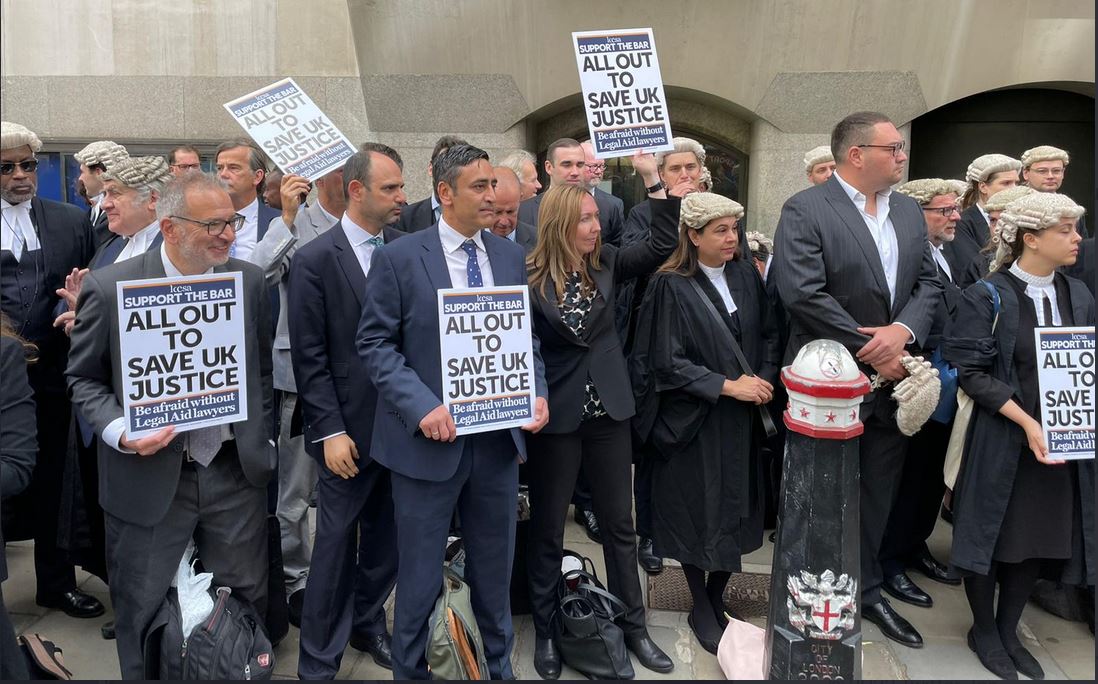Criminal barristers in England and Wales have started their strike over low legal aid funding with a warning their profession faces an “existential crisis” because of severe cuts imposed by the government.
Barristers say their incomes have decline by almost 30% in the last two decades. Specialist criminal barristers now earn less than the minimum wage with an average income of just £12,200 after expenses during the first three years of practice. Some 22% of junior criminal barristers – almost one-in-four – have quit since 2016.
In the last year, some 567 criminal trials – including 60 sexual offence cases – were unable to go ahead due to a lack of barristers to defend or prosecute them. HM Courts and Tribunal Service said there was a total backlog of 58,271 cases up to the end of April this year.
Director of the Good Law Project, Jo Maugham tweeted: “Barristers working for legal aid are the last line of defence for those targeted by a State that is often racist and increasingly authoritarian. Without them, who will stand in the way when the State comes after black people or protestors?”
Mira Hammad, a criminal barrister since 2019, said: “The criminal justice system is falling apart. Cases aren’t going ahead because there aren’t enough barristers, there aren’t enough judges, there’s not enough court resources.
“As a criminal barrister you can’t earn enough, so I do inquest work as well as crime. If I was doing solely crime I would not be able to earn a living. It’s unsustainable for anyone involved in the system.
“The fact that there’s no funding in the system means that it’s also an incredibly stressful and frustrating job to do. You don’t get paid well and you’re constantly having to work within a system that is just completely dysfunctional.”
First barrister strike since 2014
Picket lines are outside London’s Old Bailey court today – as well as at courts in Birmingham, Manchester, Cardiff, Bristol and Leeds – for the first time since 2014. They mark the start of four weeks of escalating strikes. Barristers will strike today (Monday, June 27) and tomorrow, with three days of strikes during the next week of industrial action, four the following, and a full five day strike during the final week of action.
Striking barristers will refuse to accept on new cases and “return to work” where they take on work for colleagues whose cases are overrunning.
The strike follows the Criminal Bar Association’s (CBA) rejection of a 15% uplift in fees recommended by Clar (the criminal legal aid review), saying it is insufficient following sustained and devastating cuts to funding and because it will not apply to the 58,000 case backlog in crown courts.
More than 80% of the 2,000 criminal barristers balloted voted in favour of the strike, said the CBA. Their deputy chairperson, Kirsty Brimelow, told BBC Radio 4’s Today programme that the uplift offered would not be seen until the end of next year “at the earliest” as it did not apply to the backlogged cases.
Brimelow accused the government of having a “leisurely timetable” and said they were “kicking the can down the road” while doing nothing to reduce the exodus of junior barristers who are abandoning the profession.
BT strike will disrupt remote workers
Meanwhile, BT workers are to ballot over strike action over pay. The Telegraph reports that the strike by 45,000 BT engineers and call centre staff will hit people working from home and internet users.
There will be a “clear disruption” to services for customers, insiders are warning, with striking engineers unable to install or repair phone and internet lines, while BT support staff will be unavailable to take calls.
BT frontline workers are furious that their 3.8% pay offer – equivalent to £30 per week – follows the 32% pay rise given to BT’s boss last year.
Strikes signal summer of discontent
A summer of discontent kicked off last weeks as rail strikes paralysed the network, causing chaos for commuters and other rail users.
Airports face their problems after British Airways ground staff at Heathrow overwhelmingly voted to strike next month over BA’s use of “fire and rehire” during the pandemic. Workers at Gatwick will also be balloted over strike action this summer.
Teachers, NHS staff and postal workers are also expected to vote on whether to take industrial action over their pay settlements.
Royal Mail’s offer of a 2% pay rise – where the CEO has just received a £140,000 bonus – has been dismissed by the Communications Workers Union (CWU). General secretary Dave Ward said Royal Mail has “conducted themselves insultingly and disrespectfully to key workers.
“Their conduct and particularly the imposition of such an aggressive pay offer has eroded trust among loyal workers.”
Deputy general secretary of the CWU, Andy Kerr said members will “be thinking of the soaring cost of living and the insulting treatment they’ve received by the hands of employers” when their ballot papers to strike drop through their letterboxes.




